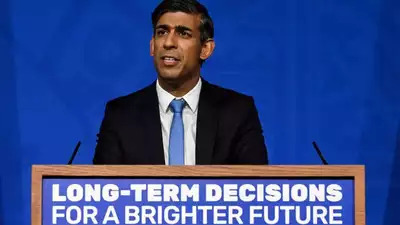
UK Prime Minister Rishi Sunak has announced a five-year delay in the ban on new gasoline and diesel cars, which was initially set for 2030. This decision has received mixed reactions and has led to concerns about the UK’s commitment to climate goals. Here are the key points regarding the delay and the reactions:
Delayed Ban on Gasoline and Diesel Cars:
The ban on new gasoline and diesel cars has been postponed from 2030 to 2035, effectively giving a five-year extension. This move is seen as a response to concerns about the costs associated with the initial deadline.
Weakening Climate Goals:
The decision to delay the ban has been criticized by environmental groups, opposition politicians, and parts of the UK industry. Critics argue that it waters down the UK’s climate goals and may hinder progress toward reducing carbon emissions.
Pragmatic Approach:
Prime Minister Sunak has defended the delay, stating that it aims to strike a more pragmatic and realistic balance between environmental goals and the impact on ordinary citizens.
Maintaining Net-Zero Commitment:
Despite the delay in the ban on gas and diesel cars, Sunak reaffirmed the UK’s commitment to achieving net-zero greenhouse gas emissions by 2050.
Other Environmental Proposals:
Sunak rejected various environmental proposals, including new aviation taxes, measures to promote carpooling, and taxes on meat. It’s worth noting that these proposals had not yet been implemented.
Industry and Political Reactions:
The decision has drawn mixed reactions. While some within the governing Conservative Party welcomed the move, it has raised concerns among automakers, environmentalists, and others. Automakers expressed frustration, as they had invested heavily in transitioning to electric vehicles.
Impact on Reputation:
Some experts and business leaders have voiced concerns that the delay may harm the UK’s reputation as a leader in green technology and climate action.
Political Considerations:
The decision to delay the ban comes after a special election in July, where the Conservative Party focused on opposing a tax on older, polluting vehicles. Some in the party believe that relaxing green policies could be politically advantageous in the run-up to the national election expected by the end of 2024.
Global Climate Concerns:
The announcement coincided with a gathering of senior politicians and diplomats at the United Nations General Assembly, where climate is a top priority. Climate experts emphasize the urgency of taking action to combat climate change.
Consensus on Climate Action:
Alok Sharma, who chaired the COP26 international climate conference in 2021, warned against fracturing the political consensus on environmental and climate action. He argued that such a move would not be electorally beneficial for any political party.
International Climate Goals:
With the world heading toward a temperature increase of 1.5 degrees Celsius above pre-industrial levels in about a decade, climate experts stress the need for countries to fulfill their net-zero commitments promptly.
In summary, the UK’s decision to delay the ban on new gasoline and diesel cars has sparked debate and concerns about its commitment to climate goals. While it is seen as a response to economic and political considerations, it also raises questions about the UK’s leadership in addressing climate change.
![]()




